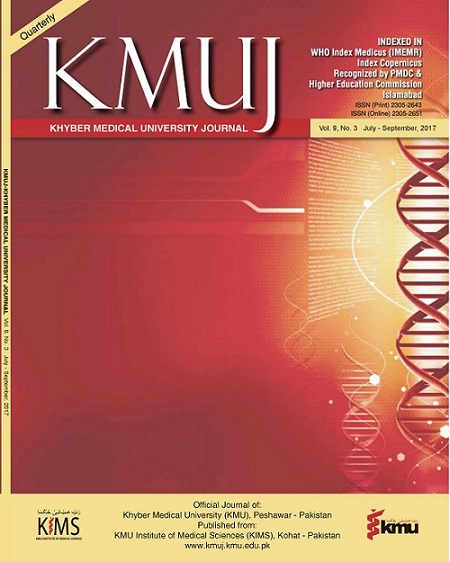KNOWLEDGE, ATTITUDE AND PRACTICE OF MOTHERS REGARDING COLOSTRUM FEEDING TO NEWBORNS IN RURAL PAKISTAN: A CROSS-SECTIONAL STUDY
Main Article Content
Abstract
ABSTRACT:
OBJECTIVE: To assess the knowledge, attitude and practice of mothers regarding colostrum feeding to newborns in North of Sindh province, Pakistan.
METHODS: This cross-sectional study involving nursing mothers who are having any children under 2 years, conducted in three districts (Larkana, Qamber Shahdadkot and Dadu) of Sindh province, Pakistan from September-2015 to January-2016. Systemic random sampling technique was used and every third woman was selected. Self-made questionnaire translated in Urdu and Sindhi language was used to assess socio-demographic status, knowledge, attitude and practice about colostrum from pregnant and nursing women. Data was analysed by SPSS-20.
RESULTS: Of the 384 mothers, 269 (70.1%) nursing mothers had some knowledge about health benefits of colostrum while 115 (29.9%) had no knowledge about health benefits of colostrum. About 72.1% (n=277) mothers offered colostrum feeding while 27.9% (n=107) discarded colostrum believing that colostrum as non-milk, non-nutritious and causing diarrhea.
The mothers who discarded colostrum offered honey (n=80/107; 74.8%); water (n=19/107; 17.7%) and herbal preparation (n=8/107; 7.5%) to babies as pre-lacteal feeding. The practice of discarding colostrum is more prevalent among the mothers aging ≤20 years (n=94/107; 87.9%), illiterate (n=89/107; 83.2%), experienced first pregnancy (n=70/107; 65.4%) and delivered their child at home (n=85/107;79.4%). Out of 384 mothers, 109 (28.4%) started breast-feeding in first hour after delivery & 231 (60.2%) mothers received guidance about benefits of colostrum feeding from the healthcare professionals.
CONCLUSION: More than a quarter mothers don’t know about the health benefits of colostrum and offered pre-lacteal feeding to babies. Majority received guidance from health-professionals.
KEY WORDS: Colostrum (MeSH); Immunoglobulins (MeSH); Enzymes (MeSH); Cytokines (MeSH); Growth Factors (MeSH); Bilirubin (MeSH); Knowledge (MeSH); Attitude (MeSH); Pre-lacteal feeding (Non-MeSH); Mothers (MeSH)Article Details
Work published in KMUJ is licensed under a
Creative Commons Attribution 4.0 License
Authors are permitted and encouraged to post their work online (e.g., in institutional repositories or on their website) prior to and during the submission process, as it can lead to productive exchanges, as well as earlier and greater citation of published work.
(e.g., in institutional repositories or on their website) prior to and during the submission process, as it can lead to productive exchanges, as well as earlier and greater citation of published work.
References
REFERENCES
Bhale P, Jain S. Is colostrum really discarded by Indian mothers? Indian Pediatr 1999 Oct;36(10):1069-70.
Joshi S, Barakoti B, Lamsal S. Colostrum Feeding: Knowledge, Attitude and Practice in Pregnant Women in a Teaching Hospital in Nepal . WebmedCentral:Int J Med Mol Med 2012;3(8):WMC003601
La Leche League International (LLLI). What is colostrum? How does it benefit my baby? 2016 [Cited on: March 04, 2017]. Available from: http://www.llli.org/faq/colostrum.html.
World Health Organization (WHO), United Nations International Chidren’s Emergency Fund (UNICEF). Global strategy for infant and young child feeding. WHO, Geneva, 2003. ISBN: 92 4 156221 8. [Cited on: March 04, 2017]. Available from:
http://www.who.int/nutrition/publications/infantfeeding/9241562218/en/
Rogers NL, Abdi J, Moore D, Nd'iangui S, Smith LJ, Carlson AJ, et al. Colostrum avoidance, prelacteal feeding and late breast-feeding initiation in rural Northern Ethiopia. Public Health Nutr 2011 Nov;14(11):2029-36. DOI: 10.1017/S1368980011000073. Epub 2011 Apr 21
Mehkari S, Zehra N, Yasin H, Rauf A, Jaliwala HA, Zehra T, et al. Breastfeeding and Weaning: Awareness and Practices among Female Health Providers working in a Tertiary Care Hospital of Karachi-Pakistan. Int J Womens Health Reprod Sci 2014;2(5):281-6. DOI: 10.15296/ijwhr.2014.45
Hanif R, Khalil E, Sheikh A, Harji A, Haris S, Rasheed MW, et al. Knowledge about breastfeeding in accordance with the national policy among doctors, paramedics and mothers in baby-friendly hospitals. J Pak Med Assoc 2010;60(10):881-6.
Kulsoom U, Saeed A. Breast feeding practices and beliefs about weaning among mothers of infants aged 0-12 months. J Pak Med Assoc 1997;47(2):54-60.
Raval D, Jankar DV, Singh MP. A study of breast feeding practices among infants living in slums of Bhavnagar city, Gujrat India. Healthline 2011;2(2):78-83.
Okolo SN, Adewunmi YB, Okonji MC. Current breastfeeding knowledge, attitude, and practices of mothers in five rural communities in the Savannah region of Nigeria. J Trop Pediatr 1999;45(6):323-6.
Kamudoni P, Maleta K, Shi Z, Holmboe-Ottesen G. Infant feeding practices in the first 6 months and associated factors in a rural and semiurban community in Mangochi District, Malawi. J Hum Lact 2007 Nov;23(4):325-32. DOI: 10.1177/0890334407307567
Uruakpa FO, Ismond MAH, Akobundu ENT. Colostrum and its benefits: A review. Nutr Res 2002;22(6):755-67. DOI: 10.1016/S0271-5317(02)00373-1
Aisha R, Batool F, Sultana S. Knowledge, Attitude and Practices about Colostrum Feeding among Pregnant Women in Military Hospital Rawalpindi of Pakistan. Open J Nurs 2016;6(4):309-13. DOI: 10.4236/ojn.2016.64032.
Khaliq A, Qamar M, Hussaini SA, Azam K, Zehra N, Hussain M, et al. Assessment of knowledge and practices about breastfeeding and weaning among working and non-working mothers. J Pak Med Assoc 2017 Mar;67(3):332-8.
Sabharwal V. Myths and beliefs surrounding complementary feeding practices of infants in India. J Commun Nutri Health 2014;3(1):34-8.
Raheem RA, Binns CW, Chih HJ, Sauer K. Determinants of the introduction of prelacteal feeds in the Maldives. Breastfeed Med 2014 Nov;9(9):473-8. DOI: 10.1089/bfm.2014.0028. Epub 2014 Jun 25.
Khanal V, Adhikari M, Sauer K, Zhao Y. Factors associated with the introduction of prelacteal feeds in Nepal: findings from the Nepal demographic and health survey 2011. Int Breastfeed J 2013 Aug 8;8(1):9. DOI: 10.1186/1746-4358-8-9.
